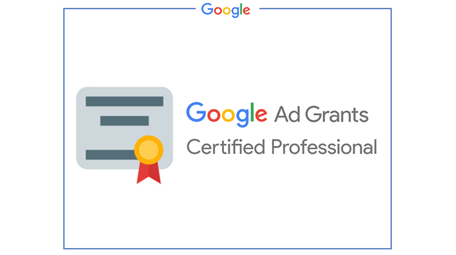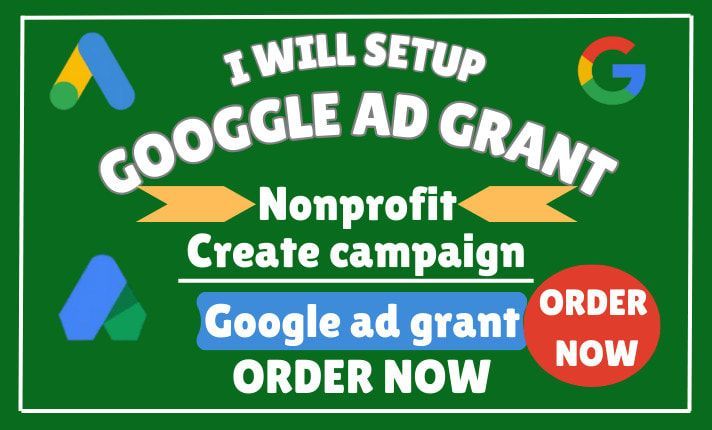


What Is the Google Ad Grant?
Google Ads are a digital marketing solution that businesses and nonprofits use to promote their products, services, and other content to web users. Essentially, advertisers bid on keywords that strategically target their ideal audience. If they win the bid, their ads will appear on Google’s search engine results pages (SERPs).
The Google Ad Grant program is a free version of Google Ads for select charitable organizations. While regular Google Ad accounts have to pay per ad click, Google Grant participants can display their advertisements for free. That way, nonprofits can allocate less of their budgets toward marketing.
The grant gives eligible nonprofits $10,000 in free monthly advertising credits. As long as the organization complies with the program’s rules, the grant will automatically renew each month.
Organizations can use their grant money to bid on different keywords and promote specific pages on their website through text-based ads on the SERPs for those keywords. These promoted pages most often include:
Donation pages
Service pages
Educational content
For example, when you search for “ocean conservation” on Google, you’ll see advertisements at the top and bottom of the page for content from nonprofits dedicated to supporting this cause. Some of these are donation pages, while others are service pages or blog posts that explain the organization’s work.
The program’s overall goal is to make a positive impact by enabling nonprofits to increase awareness of their causes. Since 2003, Google has awarded more than $10 billion in free advertising to more than 115,000 nonprofits across 51 countries.
While the Google Ad Grant program is entirely free, creating and maintaining your account will take substantial time and effort. To truly be successful, you’ll need to either devote staff time to managing your ad campaigns or outsource the work to a Google Ad Grants agency.
How Do Google Ads Differ From Organic Search?
Google Ads and organic search results serve different purposes but are both essential for online visibility. While Google Ads are paid placements that appear at the top and bottom of SERPs, organic results are unpaid listings that appear based on SEO factors and each page’s relevance to the search query. Organically achieving high rankings requires optimizing website content, building backlinks, and ensuring a good user experience.
Nonprofits should leverage both strategies to maximize their online impact. Plus, when you optimize your website for SEO, you’ll also have effective landing pages to promote via Google Ads.
While our team at Getting Attention can help craft your Google Ads strategy, we recommend turning to the experts at Nexus Marketing for your SEO needs, particularly if you generate significant revenue by selling products, programs, or services.
With more than 10 years of experience in ROI-driven SEO within the mission-driven sector, Nexus Marketing’s talented team can craft strategic SEO content that captures your brand and reaches your audience. The agency has an extensive network of 500+ partners in the nonprofit, association, faith-based, education, and healthcare sectors, so you can scale your organization’s authority-building strategy and fuel your SEO growth.
What Are the Google Grant Eligibility Requirements for Nonprofits?
To apply for Google Ad Grants, nonprofits must first meet the program’s universal standards, which include:
Holding current and valid charity status. For U.S.-based organizations, you must have current 501(c)(3) status, meaning that the IRS recognizes you as an official charitable organization and exempts you from tax obligations. Google requires organizations to be verified by Percent.
Acknowledging and agreeing to the Google Ad Grant’s required certifications. You’ll need to agree to Google’s process of receiving and using donations obtained from the grant, as well as the Google for Nonprofits and Google Ads terms of service.
Having a functioning website that provides valuable content on your nonprofit and mission. Any information you promote through Google Ad Grants has to live on your nonprofit’s website. As part of their standard eligibility check, Google requires that you own the domain, have unique website content, and feature a detailed description of your organization’s mission and activities.
Having an SSL certificate. SSL stands for Secure Sockets Layer and is a security protocol between a web server and a browser. It will cause a lock icon to appear in the navigation bar in Google Chrome. If there is no lock and you see the words “not secure” next to your website’s URL, it means SSL is not installed or there is another issue.
If your organization has a solid foundation in the digital space, it doesn’t take much to be eligible for the Google Ad Grant. However, to save time and trouble, Google Ad Grant managers can help you check your eligibility.
Which Organizations Are Not Eligible for Google Ad Grants?
While the Google Ad Grants program is widely available to many nonprofits, there are some exceptions. Organizations that are not eligible to apply for Google Ad Grants include:
Governmental entities and organizations
Hospitals and healthcare organizations
Schools, academic institutions, and universities—however, the fundraising arms of educational organizations are eligible!
The Google Ad Grants team implements these requirements to ensure that only organizations that will genuinely benefit from the program apply. However, Google also offers a similar grant program for educational institutions in addition to the nonprofit program. If that applies to your organization, check it out!




